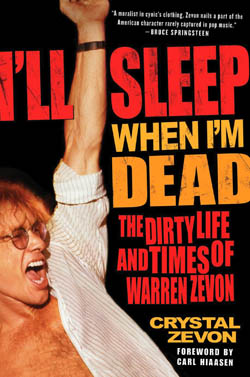The Life of Reckless Rocker Warren Zevon, Through an Ex-Wife’s Eyes
Love and Fame and Death
In I’ll Sleep When I’m Dead: The Dirty Life and Times of Warren Zevon, Zevon’s ex-wife Crystal offers an uncensored look at the tumultuous life of one of rock ‘n’ roll’s quintessential wild men. Through interviews with the likes of Bruce Springsteen, Jackson Browne, Stephen King, Billy Bob Thornton, and Carl Hiaasen, as well as Zevon’s children, the many (many, many) women he loved, and his own journals, we get an intimate, oftentimes unbelievable glimpse of this witty, dangerous, and dirty talent. Before his 2003 death, Warren extracted from Crystal a promise: to expose the sweet and sordid truth of the “Excitable Boy,” in all its drug-, alcohol-, and sex-soaked glory. The result leaves the reader stunned, and scrambling to find that Zevon CD that’s probably still lurking somewhere on the shelf.

Crystal Zevon spoke with me recently about the book.
Were you worried about how the book might be received, given that you’re his ex-wife? Yeah. I talked to Warren about it; he just shrugged it off. I worried, because he asked me to tell the truth-even the awful, ugly parts. “That’s the excitable boy that wrote them excitable songs,” is how he put it. And it wasn’t only exposing him, but me, my family, and other people. Many times I’d say, “I can’t do this.”
What was it like reliving your relationship through Warren’s journals? It was cathartic, though part of me resisted going back. The good times were sometimes more painful, because with the bad times I could say, “Well, we moved beyond that,” but the good times were once-in-a-lifetime experiences. Doing the interviews was generally really fun. But when I was alone with the journals, it was gut-wrenching sometimes.
Did you originally envision the book taking the format it did, or did that come about organically? Very early on, I imagined it as an oral history told through the voices of lots of people, including his journals. I wasn’t comfortable analyzing or interpreting his thoughts or feelings or reasons for doing something. I felt his story would be better told-and more interesting, honestly-if it was told by all these people.

Were you shocked by anything you uncovered? The degree of excess, the degree of torment, the degree of obsession, and how many women-I didn’t know the extent of it. But somewhere along the way, it hit me that I wasn’t really surprised, and that that was why Warren asked me to write the book. I knew him. He’d let himself be exposed to me when we were young, vulnerable, and open. Later, he compartmentalized, so people saw different sides of him, which was another reason for the book’s format, so different people could talk about those different sides. But I knew the whole guy.
There’s a great quote from Bonnie Raitt: “We had to be truly twisted to get Warren, and I mean that in a good way.” Do you agree? (Laughs) Well, yes and no. Some of what he wrote requires a certain perspective that might be a little skewed from your average Joe, but I also think his songs are very accessible. Like on the Life’ll Kill Ya album, the song that closes, “Don’t let us get sick / Don’t let us get old / Don’t let us get stupid, all right?” It’s so simple. Nobody wants to go down with one of those awful diseases where you don’t make sense anymore, but he says it with that little twist of phrase that’s for everybody.
After he got sick and started drinking again after 17 years of sobriety, what did you think? It broke my heart.
It seemed like he got a handle on it by the time he passed away, though. He did. After the album [The Wind] was finished, he reprioritized. He felt he’d done his job for whatever legacy he was going to have, and made his family his priority. He got sober shortly before he died, and managed to be there for the births of his grandsons, and make peace with himself and the people around him.
Warren was never hugely successful-commercially or financially, anyway. Do you think he’d see any irony in the re-releases of his music, the interest in this book, now that he’s gone? Definitely. He always believed people would discover him after he died. After he finished the album, he said, “Now I have to hurry up and die, so they can nominate me for a Grammy.” He didn’t believe they’d ever do it if he was alive, and he was right; he got two Grammys posthumously.
You two lived in Santa Barbara for a while; do any memories stand out? Oh yes. We decided to move to Santa Barbara when he opened for the Grateful Dead. We were staying at the El Encanto; we had so much fun! Sometimes we took the baby down to the beach, even on cold days when nobody was out; we’d dig our toes in the sand and walk up and down the beach : we loved it.
4•1•1
Crystal Zevon will be signing I’ll Sleep When I’m Dead at Borders Books on State Street, June 13 at 7 p.m. The event will also include a reading and discussion. For more information, call 899-3668.



